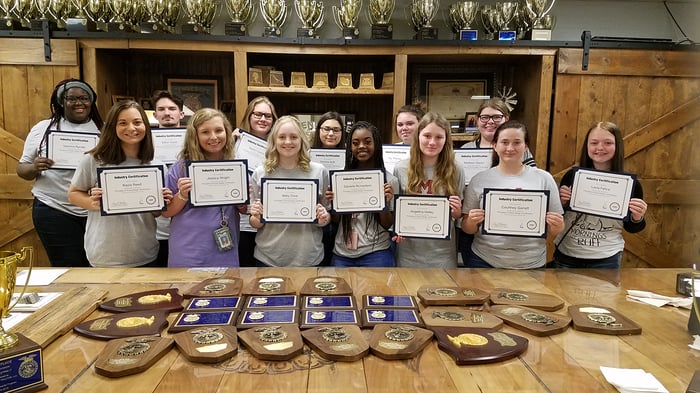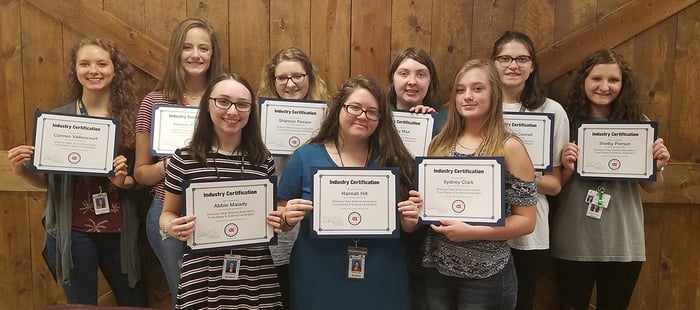Case Study
A Culture of Success
The faculty at Munford High School, located in Munford, TN, is dedicated to providing students with a firm knowledge and skill base to ensure students will find success in whatever path they follow after high school. From academics to extracurricular activities, Munford teachers aim to provide their students with the tools they need to succeed in and out of the classroom. “Once a child knows what it’s like to be successful, it boosts their confidence,” said Munford principal, Dr. Courtney Fee, “They will have a taste of success, and if they don’t have that success in the future, they will feel the desire to get it back.”

Perhaps one of the best places to observe success on the Munford campus is the agricultural science program. A central part of the Career and Technical Education (CTE) Department, the agricultural science program offers a wide variety of study pathways, including animal systems, plant systems, environmental science, power structure technical systems, horticulture science and agricultural business. The program aims to combine academic knowledge and principles with hands-on experiences and opportunities. Agricultural courses combine classroom lessons with time spent in one of the program’s many facilities, such as the greenhouse, floral shop, environmental lab, veterinary science lab, food science lab and an agricultural mechanics shop.
Integrating Certifications
Ann Johnson, one of five teachers in the Munford agricultural science program, is a cornerstone of the Munford CTE Department. Johnson joined the department 25 years ago and has been an integral part of the program’s success. Clair Hammond is a newer addition to the program, arriving at Munford four years ago and bringing 24 years of experience as an agricultural science teacher. At Munford, Hammond has quickly cemented herself as a vital part of the program’s mission.
Inspired by the Tennessee Department of Education’s support of industry certifications and their desire to enhance their student’s employability skills, Johnson and Hammond began incorporating industry certifications in their classes in 2018. Because they were already utilizing educational materials from iCEV, an online platform for Career and Technical Education curriculum and certification testing, Johnson and Hammond elected to integrate industry certifications hosted on the iCEV testing platform.

“I am pushing the Benz School of Floral Design Principles of Floral Design Certification because those are practical things my students could have to obtain a job in our local community,” said Johnson, “The American Meat Science Association Food Safety and Science Certification was something we felt no matter where they went to work, having a food safety certification would possibly give them an edge or an advantage.”
Throughout the school year, students prepare for the certification exam through class lectures, activities and supplemental study materials offered by iCEV. In some classes, Johnson and Hammond include the certification exam as a mandatory element of the class, while in other courses, students are offered the chance to take the certification exam as a capstone to the course.
In the agribusiness class at Munford, Johnson includes the Benz School of Floral Design Principles of Floral Design Certification as a crucial element of the course design. During the first year Munford offered the certification, 17 students successfully earned the Benz School of Floral Design Principles of Floral Design Certification. Johnson and Hammond co-teach the food science course, and in the two years the American Meat Science Association Food Safety and Science Certification was offered, 14 students have passed the certification exam. This past school year, Hammond utilized the Elanco Veterinary Medical Applications Certification in her veterinary science course. Currently, students in the agribusiness class are preparing to the earn the Center for Financial Responsibility Personal Financial Literacy Certification, while the Munford environmental science class will be among the first cohort of students nationally to earn the Ducks Unlimited Ecology Conservation and Management Certification.
The Impact of Certifications
The industry certifications have contributed to Munford’s success-driven culture. With the certifications, Munford students have solidified their role as a competitor at the state and national level in several Leadership Development Events (LDEs) and Career Development Events (CDEs). In 2019, the Munford Floriculture Team placed first in the Tennessee Floriculture CDE, and all four team members were among the top five high-individuals.

As the first-place team, Munford qualified for the National Floriculture contest and was awarded a silver distinction at the 2019 National FFA Convention. Kayla Reed, a member of the Munford Floriculture Team, credits the Benz School of Floral Design Principles of Floral Design Certification for her success in the Floriculture CDE. “If I hadn’t earned the certification, I wouldn’t have qualified for Nationals,” said Reed.
Haley Wilson was amongst the first group of students at Munford to earn the American Meat Science Association Food Safety and Science Certification and is preparing to earn the Benz School of Floral Design Principles of Floral Design Certification. Using the knowledge verified by the American Meat Science Association Food Safety and Science Certification, Wilson developed nationally qualifying Agriscience Fair projects and helped her Food Science CDE team advance to the National FFA Convention.
Along with contributing to extra-curricular success, earning industry certifications has helped Munford students gain employment opportunities. Wilson was able to secure a job in the foodservice industry by listing the American Meat Science Association Food Safety and Science Certification on her résumé. Another Munford student, who earned the Elanco Veterinary Medical Applications Certification, was hired by the local Tractor Supply dealer. Her supervisors soon recognized the knowledge and skills she possessed related to animal health and care, and because of her aptitude, she was quickly promoted to a management position. When the student graduated from Munford, Tractor Supply transferred her to a store closer to the university she planned to attend so she could keep her job while attending college. She even moved a month early so she could begin her new position at Tractor Supply. “The certification definitely helped her in her job and helped her advance quickly in position,” said Hammond.

Not only do industry certifications provide more opportunities for employment and extra-curricular achievement, industry certifications have also been shown to increase student motivation and productivity. In courses where industry certifications are incorporated, students have been shown to take coursework more seriously when they can see the direct application of their efforts to career opportunities. In her classes at Munford, Johnson has seen the effects of earning an industry certification can have on students’ drive and motivation.
“The kids seem to take their classes more seriously,” said Johnson, “They see that earning a certification is something substantial, and it changes their attitude about the coursework.”
In a study by the Foundation for Excellence in Education, students who earned industry certifications showed higher levels of academic success than students who did not earn industry certifications. As reported by the study, students who earned industry certifications had a 96.6% graduation rate, compared to a 73.3% graduation rate for students without certifications. Certification earners maintained an average GPA of 3.08, compared to a 2.72 average from students who had not earned certifications. Earning an industry certification also led to higher attendance rates.
Those who earned certifications were only chronically absent 9.1% of the school year, compared to students without certifications who were absent 15.3% of the year. Of the students who earned industry certifications, 50% were enrolled in AP or dual credit courses, while only 32.9% of non-certified students enrolled in these programs. Twelve percent of students who did not earn an industry certification received some form of disciplinary action during their academic career, and only 6% of students who earned certifications required disciplinary measures.
As demonstrated by the students at Munford, industry certifications are a valuable tool in boosting academic performance, increasing competitiveness in extra-curricular activities and enhancing employability opportunities. By offering their students the opportunity to earn industry certifications, Johnson and Hammond have ensured their students know what it is like to succeed in and out of the classroom and are prepared to continue on the path of success long after they leave the halls of Munford High School.
MUNFORD HIGH SCHOOL
MUNFORD, TENNESSE
About iCEV
Since 1984, iCEV has specialized in providing quality CTE curriculum and educational resources. iCEV is the most comprehensive online resource for CTE educators and students, offering curriculum for several major subject areas, including agricultural science, trade & industrial education, business & marketing, career exploration, family & consumer science, health science, law enforcement and STEM education. Additionally, iCEV acts as a testing platform for industry certifications. Leading companies and organizations utilize iCEV as the testing platform for their certifications. For more information, visit www.icevonline.com.
